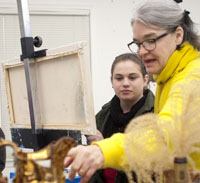‘The Greatest Gift Is to Give’: Brit LeCompte Supports Students by Funding Scholarship

Brit LeCompte explains why he gives to support scholarships for Randolph students.
The first time Brit LeCompte saw Virginia was during a vacation with his family to the Front Royal area. “My uncle decided to take the skyline drive to Stauton,” Brit said. “I got in this little yellow plane, and we flew over the ridge and saw the Shenandoah. It was so beautiful.”
Decades later, after losing his wife, Gladys, in 1995, Britt moved from Delaware to Arizona and then to British Columbia. However, after the terrorist attacks on Sept. 11, 2001, he came home to America—deciding to move to Lynchburg, a place he had visited many times since that first trip nearby with his uncle.
Today, he lives in a charming home filled with treasured antiques located near Randolph. Now 99 years old, Brit still remembers a promise he made with his wife who studied with Anna Pavlova, the Russian prima ballerina, before building a successful career with DuPont. In 1983, the couple decided that they wanted to leave a legacy of education.
“That lady up there is my wife,” he said, glancing lovingly to a portrait above his mantle. “She made something of her life because she had commitment, because she was positive and because she worked for what she wanted.”
A former marketing executive, investor and self-described “peddler,” Brit feels blessed by the challenges and opportunities in his life. A farm boy from Delaware, he served in World War II on both the American and Pacific Theater fronts. In fact, he survived a massive typhoon in Okinawa that blew over his truck. He and several others survived for three days with just a tent, raincoats for a floor and sparse rations of potted meat, deviled eggs and cheese.
“I didn’t come from the bottom. I wormed my way to the bottom,” Brit laughed. “In America, you can go from the very lowest to the very top. We have some of the greatest people on the planet here in this country, and all we have to do is support them and the great things they can do. Education is the way to do that.”
Randolph is one of four institutions he has chosen to support with scholarships. Brit is content knowing he is fulfilling a commitment he made with his wife—and making a difference in the world, one student at a time.
“The greatest thing is to give,” he said. “I’m rewarded when young people get a better chance for education. It feels good to know that we are making great minds for this country.”
As for his wife, Brit knows exactly what she would say if she heard about his efforts to help students.
“She’d say, ‘I taught him everything he knows,’” he said with a big grin.
This article was written prior to Brit’s death in July 2020.

